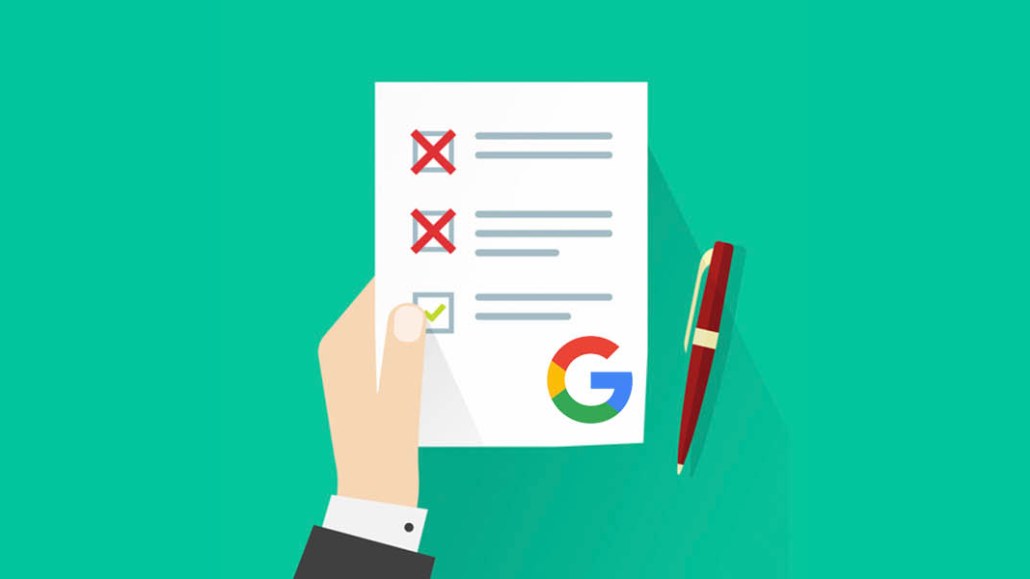Secure your place at the Digiday Media Buying Summit in Nashville, March 2-4
In graphic detail: Google’s Ads Safety Report shows suspect ad activities are on the rise

Big Tech platforms are under fire from all directions, with last week’s grilling of TikTok’s CEO in front of congress a prime example of the political antipathy such players face.
None of this cohort has faced more of this scrutiny than Google — a company that is already under the microscope for its business practices. And it is under such pressure that it takes any opportunity to mount a public defense.
Earlier this week, Google highlighted its efforts to be a good corporate citizen with its latest Ads Safety Report, plus the unveiling of its Ads Transparency Center — a repository of advertisers where third parties can search to verify where ad dollars are coming from.
In a blog post promoting its latest efforts, Alejandro Borgia, Google’s director of ads privacy and safety, noted how the company removed 2 billion more ads last year, compared to previous years.
“In 2022, we added or updated 29 policies for advertisers and publishers,” he wrote. “This included expanding our financial services verification program to 10 new countries, expanding protections for teens, and strengthening our election ads policies.”
Policy enforcement
The top offending ads in the “bad ads” category in 2022 were those that “abuse the ad network” (1.36 billion ads fell into this category), followed by trademark-infringing ads (562 million) that caused Google to block or remove ads.
Google maintains the causes behind the uptick in the number of ads stopped between 2021 and 2022 were updated policies, as well as increased investment in the technology and manpower required to screen such content.
“This represents an increase of 2 billion more ads removed in 2022 from the previous year,” read Borgia’s blog post. “We also blocked or restricted ads from serving on over 1.5 billion publisher pages and took broader site-level enforcement action on over 143,000 publisher sites.”
Publisher enforcement
According to Borgia, Google took site-level enforcement on 143,000 publisher websites in 2022, up from 63,000 during the previous 12-month period. He further noted how The Ads Transparency Center will let users check what specific ads an advertiser has run, including which ads ran in their region as well as the dates of their last campaign activity.
Additionally, Google also maintains that it suspended more than 6.7 million advertisers’ accounts in 2022. Athough, for Nandini Jammi, co-founder of ad tech watchdog body Check My Ads, the online advertising giant needs to provide further context in order to provide full transparency. “We don’t know the percentage [of the total number of ads Google serves], or what this actually means … this could be just 0.05% of all of their business,” she added.
Jammi further said that Google’s claims of policing the ad industry from bad actors would be better validated by engaging in more granular-level checking of its ads, as opposed to telegraphing a piecemeal approach. “Without context, the numbers are essentially meaningless, they could put up any number and it will make no difference,” Jammi concluded.
More in Media

From feeds to streets: How mega influencer Haley Baylee is diversifying beyond platform algorithms
Kalil is partnering with LinkNYC to take her social media content into the real world and the streets of NYC.

‘A brand trip’: How the creator economy showed up at this year’s Super Bowl
Super Bowl 2026 had more on-the-ground brand activations and creator participation than ever, showcasing how it’s become a massive IRL moment for the creator economy.

Media Briefing: Turning scraped content into paid assets — Amazon and Microsoft build AI marketplaces
Amazon plans an AI content marketplace to join Microsoft’s efforts and pay publishers — but it relies on AI com stop scraping for free.








